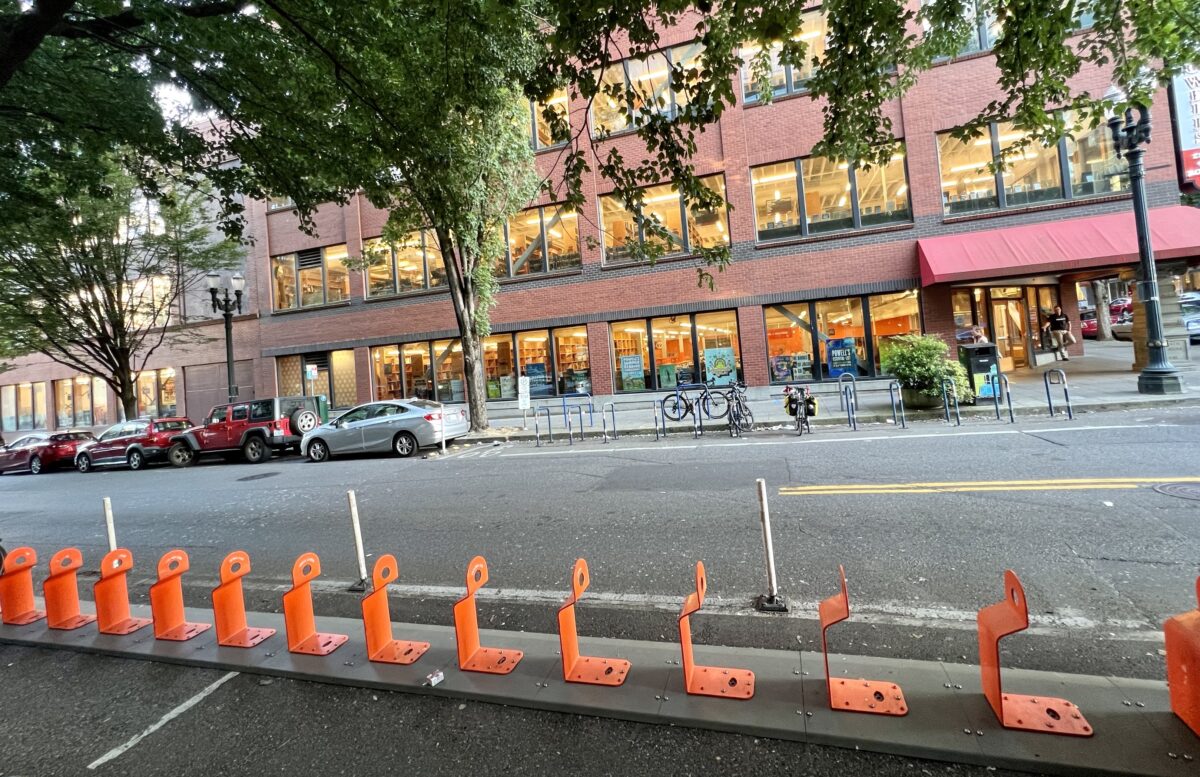Business at Biketown, Portland’s electric bike share program, is booming. Since rolling out its electric bikes in 2020, the service has expanded across the Portland area, and June 2022 was the highest ridership month in its history, with 50% more rides than the same period last year.
Biketown’s diverse base of users can be attributed to this expansion. So too can the Biketown for All program, which gives people who qualify for low-income government programs like SNAP free ride credits. As we’ve pointed out, high gas prices may also be encouraging people to ride the bikes. These are all good things – we want as many people on bikes as possible!
Unfortunately, it appears the program is having trouble keeping up with demand.
“Bikes parked away from stations are significant operationally. They add to time and effort needed to replenish the stations.”
– Dylan Rivera, PBOT
The last time Biketown added more bikes to its fleet was in 2020 when it went from having a fleet of 1,000 regular bikes to 1,500 e-bikes. Gauging from the empty bike docking stations around the city, however, 1,500 is no longer enough, especially now that the service area has expanded.
Even if there is a bike or two parked at a station, there’s no guarantee it will be charged. And if you’re with a group, good luck. Finding one charged bike is hard enough, but finding two or three near each other can seem an impossible feat.
While biking near SE Division and 34th Avenue the other day, I noticed a couple standing at the Biketown station looking confused. Neither of the two bikes parked at the station were functional, although they were showing up as available on the app. The nearest bike was half a mile away on Hawthorne, and it was hot outside. They told me they didn’t have anywhere they needed to be – they just wanted to try out the bikes they’d heard so much about. This could’ve been a chance for two people to learn how fun and useful electric bikes can be, but since they couldn’t find one to ride, they decided to skip it.

I took to Twitter to see if more people had stories to share about their recent Biketown disappointments, and received many disheartening replies.
“I had several friends visit Portland and they couldn’t find five bikes relatively close to the restaurant we met at for lunch so they chose to drive instead,” said Portlander Nick Hodge.
Stories like these are concerning to advocates. A great bikeshare system could be a real game changer for getting people out of their cars. An inadequate one could push people even further into car dependency.
Transportation advocate Tony Jordan, who said he has trouble finding a charged bike near where he lives in Sunnyside, told me via Twitter that while he loves Biketown, he now hesitates to recommend it to people who aren’t already carfree.
“If they have a bad experience, they’ll give up forever,” Jordan said.
Dylan Rivera, Public Information Officer at Portland Bureau of Transportation, said although the trouble people are having with Biketown is real, the program isn’t planning on expanding its fleet in the near future. He attributed the trouble people are having with Biketown to its surge in popularity, along with the fact that people don’t always return bikes to stations, instead parking them in a more convenient location and eating the $1 out-of-station fee.
According to Rivera, 45% of all Biketown trips are ending outside stations, and it’s straining the program.
According to PBOT, 45% of all Biketown trips are ending outside stations, and it’s straining the program.
“The option of parking outside of a station is a super convenient feature of our system,” Rivera said. “But bikes parked away from stations are significant operationally. They add to time and effort needed to replenish the stations, and therefore add to the operational cost of the system.”
I have been guilty of locking Biketown bikes to any old bike rack, and I think it’s reasonable you’d want to do this – the $1 fee doesn’t seem so bad if you’re in a hurry and you can’t find a station right by your destination, or you just don’t want to walk from a station in the heat. But though I wouldn’t shame someone else for doing it, I’ll think twice about parking outside a station now.
I’ve seen the wonders of Biketown in action. When my mom came to visit me in April, I felt completely comfortable knowing we could get around the city without renting a car because of this service. We rode bikes from the Alberta area to Richmond to downtown, and it was easy, convenient and fun.
But Biketown’s fickleness is most impactful for people the organization set out to help with the Biketown for All program. People who rely on public transportation have been unable to depend on TriMet during its bus driver shortage – and now the service intended to mitigate the impacts of inequitable transportation planning is leaving people hanging as well.
It’s unclear if Biketown will impose harsher penalties on people who park outside of stations, or if they have a plan for dealing with this problem at all.
The politics in Portland when the system was first funded required elected officials to promise that “no public money” would be spent on it. But that was then, and this is now: Biketown is a successful public transit service that deserves to be funded as such. We cannot and should not continue to starve this system — especially while Portland’s car use rates skyrocket and transit service plummets.
When the program first switched to electric bikes almost two years ago, the city planned to have a fleet of 4,000 by 2024. Hopefully we’ll see more orange bikes around the city sooner than that.




